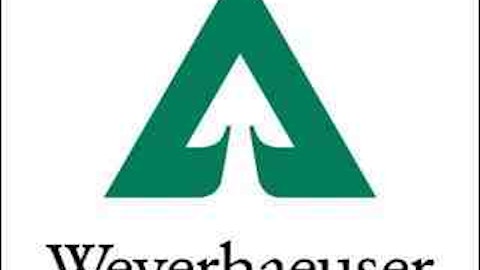At the 2012 Invest for Kids conference, Alex Klabin of Senator Investment Group pitched an idea he calls ‘Pulp Friction’. Klabin’s pick, Rayonier Inc. (NYSE:RYN), is a timber REIT with performance fiber operations. Klabin says about Rayonier, “it has sex appeal…with the fiber segment having high margins and high barriers to entry and the REIT segment being like an annuity and inflation hedge.” Both Klabin and Doug Silverman worked at York Capital Management before starting Senator Investment Group in 2008. The duo and their team focus on event-driven investing and distressed situations with around $3 billion of assets under management. Check out all of Klabin and Senator Investment’s stock picks. Rayonier has attracted various other top fund managers besides Senator, including First Eagle Investment Management and Jim Simons. Check out all the funds owning Rayonier.
The fiber segment is focused on making pulp, which is then rolled into paper and sold to chemical companies, such as Eastman Chemical Company (NYSE:EMN), for treatment and then made into cigarette filters—this is about 65% of the fiber segment’s business. Worth noting is that Rayonier’s fiber segment is more than just a manufacturing company, but also operates a lab, which adds to the specialization of their products. Eastman and other major chemical companies are also a great way to bet on a global recovery. Given Eastman is a key Rayonier customer, its outlook is important for Rayonier. The prospects are positive for Eastman, having posted 3Q results of $1.57, versus estimates of $1.42. Recent 2013 EPS forecasts were also raised from $6.20 to $6.40. This prompted S&P to boosts its price target from $62 to $68 on the stock.
Rayonier’s closest competitor as a timber REIT is Plum Creek Timber Co. Inc. (NYSE:PCL), while other major timber REITs are Weyerhaeuser Company (NYSE:WY) and Potlatch Corporation (NASDAQ:PCH). Rayonier, Plum Creek and Weyerhaeuser are the top three timber stocks by market cap. Plum Creek is the largest private timberland owner in the U.S. with sales expected to be up 10% in both 2012 and 2013 on the back of an improving housing starts, which is expected to rise 20% in each of the next two years. Plum also has a robust inventory of real estate, planning to develop over 100,000 acres of land over the next fifteen years, which should be able to be sold at high margins.
Weyerhaeuser is one of the world’s largest integrated forest products companies, growing timber, and making/selling forest products. Weyerhaeuser sells both timber products and fibers. The timber segments made up 16% of 2011 revenues, while fibers made up 32%. S&P recently raised its price target to $30, compared to the current trading price around $26.30. Weyerhaeuser is already seeing the benefits of an improving housing market, where last quarter the company saw quarter over quarter growth of its wood products division jump 36%. Weyerhaeuser, having completed its conversion to REIT status, should continue to raise its dividend payout ratio to a level comparable to that of similar REITs, possibly boosting its dividend from the current 2.6% yield to 4.0%-4.5% over the long term.
Potlatch is one of the smaller timber REITs, harvesting timber in a few select states. Unlike the other REITs, Potlatch is strictly a timber producer and has no fiber segment. Potlatch is up 20% year to date, but also trades at the highest P/E at over 50x earnings. The run up came as Potlatch saw a string of positive earnings beats, but the REIT is slowing losing its edge as earnings beats have started to narrow.
For 3Q, the Rayonier posted EPS of $0.62, compared to $0.71 for the same quarter last year. Sales are expected to be up 5-7% in 2012, and up another 10% in 2013. Driving this increase will be elevated prices for cellulose products that are used in cigarette filters and a recovering housing market, as well as increased demand from China for lumber. Rayonier pays a solid timber REIT dividend that yields 3.6%, compared to the average dividend of the other three REITs’ average yield of 3.3%. Rayonier’s dividend only represents around 50% of its funds from operations, as opposed to Plum, which is around 95%. Rayonier also has the lowest debt to equity ratio of all the REITs at 0.7 – Plum has a debt to equity ratio of 1.6, Weyerhaeuser is at 1.1, and Potlatch is at 2.4.
Klabin’s real catalyst for generating serious returns for Rayonier investors is the possible spin off of Rayonier’s fiber business. The fiber business is generally a high margin-high barrier to entry industry and Klabin expects Rayonier’s fiber segment to grow EBITDA by 50% over the next couple years, from $400 million to $650 million. Driving a potential spinoff of its fiber business will be a ramp up in earnings in fiber segment. Consequently, Rayonier may blow its REIT test in a couple years, which is a test that REITs are required to pass to retain REIT status, and in its basic form states that only a certain portion of a REITs earnings can be derived from non-REIT operations.
Rayonier actually trades at a steep discount on a P/E basis to the other timber REITs—Rayonier trades at 24x, versus Plum at 37x and Weyerhaeuser at 46x. Klabin believes there are no perfect competitors, and the EBITDA multiple that Rayonier trades at should actually be higher. Klabin notes that the company trades too much like a timber company and the REIT’s fiber business is being overlooked.
Klabin values the REIT’s southeastern focused timber properties at $3.9-$4.0 billion based on current land values. According to Klabin, many analysts are valuing the REIT at 5x EBITDA, which again is based on many imperfect competitors. Klabin believes the conglomerate should trade around 9x-11x EBITDA. By valuing the timber operations at $4 billion and placing a low-end multiple on the fiber operations of 8.5x EBITDA, Klabin believes Rayonier could see upside of 30%-60% over the next two years.






